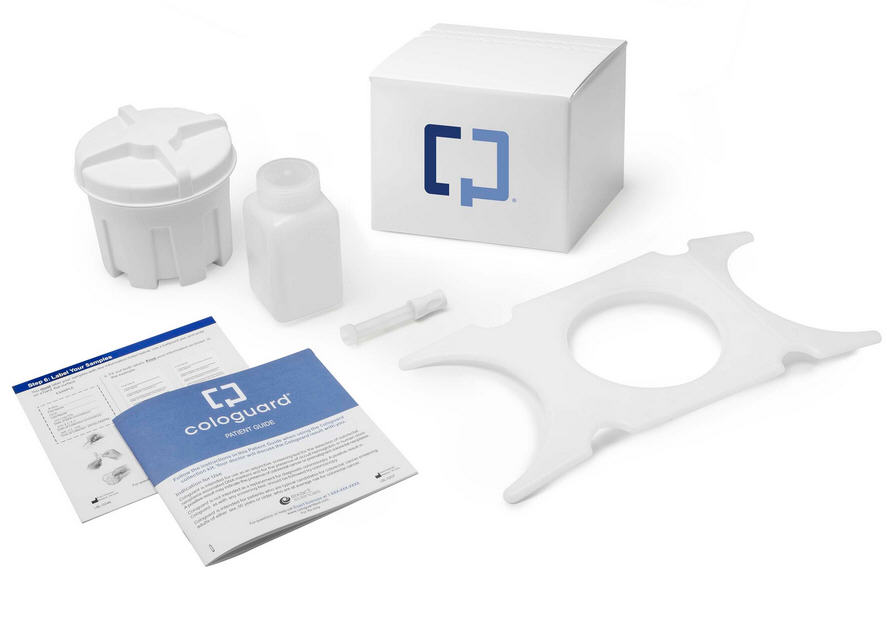-
Cancer
Knowledge of Positive Cologuard Test Improves Colonoscopy Performance, Mayo Clinic Study Shows
 SAN DIEGO – An endoscopist’s knowledge of a positive Cologuard test improves colonoscopy performance, according to a poster presentation at last week’s Digestive Disease Week conference.
SAN DIEGO – An endoscopist’s knowledge of a positive Cologuard test improves colonoscopy performance, according to a poster presentation at last week’s Digestive Disease Week conference.
Cologuard is an at-home, stool-DNA colorectal cancer screening test that has been approved by the U.S. Food and Drug Administration. This test, available by prescription only, is reimbursed by Medicare and covered by an increasing number of commercial health care plans.
Researchers from Mayo Clinic compared results of colonoscopies following a positive result from Cologuard (unblinded) with colonoscopies performed by those who were not aware of the Cologuard result (blinded). Unblinded endoscopists found polyps or hemorrhagic lesions 83 percent of the time and precancerous polyps in 70 percent of patients, compared to 68 and 53 percent of blinded endoscopists, respectively.
“Endoscopist knowledge of a positive Cologuard result appears to enhance colonoscopy quality, based on observed differences in number of detected lesions, total adenomas, detection of inconspicuous or flat lesions, and withdrawal times.” says David Johnson, M.D., a gastroenterologist at Mayo Clinic’s Rochester campus. “This increase in yield could translate into more true-positive and fewer false-negative results than estimated from blinded pre-approval studies.” The study also showed that unblinded endoscopists spent 46 percent more time and found twice as many polyps per colonoscopy.
The blinded group included a portion of the Cologuard-positive patients who participated in the DeeP-C clinical study, which was published in the April 2014 New England Journal of Medicine. The DeeP-C study evaluated Cologuard’s performance in nearly 10,000 patients. Cologuard was found to be 92 percent sensitive in detecting colorectal cancer with 87 percent specificity.
MEDIA CONTACT:
Joe Dangor, Mayo Clinic Public Affairs, 507-284 5005, newsbureau@mayo.edu
In August 2014, Mayo Clinic became the health care organization to offer Cologuard. The Cologuard technology platform was co-developed by Exact Sciences Corp. and Mayo Clinic as part of a broad, exclusive collaboration.
David Ahlquist, M.D., a Mayo Clinic gastroenterologist is co-inventor of the test.
Dr. Ahlquist and Mayo Clinic have a financial interest in Cologuard. Neither Mayo Clinic nor Dr. Ahlquist receives royalties for Cologuard tests ordered for Mayo patients by Mayo physicians.
About Exact Sciences
Exact Sciences Corp. is a molecular diagnostics company focused on the early detection and prevention of the deadliest forms of cancer. The company has exclusive intellectual property protecting its noninvasive, molecular screening technology for the detection of colorectal cancer. For more information, follow Exact Sciences on Twitter @ExactSciences, or on Facebook.
About Cologuard
Cologuard was approved by the FDA in August 2014, and results from Exact Sciences' prospective 90-site, point-in-time, 10,000-patient pivotal trial were published in the New England Journal of Medicine in March 2014. Cologuard is included in the colorectal cancer screening guidelines of the American Cancer Society, and stool-DNA is listed in the screening guidelines of the U.S. Multi-Society Task Force on Colorectal Cancer.
Cologuard is indicated to screen adults of either sex, 50 years or older, who are at average risk for colorectal cancer. Cologuard is not for everyone and is not a replacement for diagnostic colonoscopy or surveillance colonoscopy in high-risk individuals. False-positives and false- negatives do occur. Any positive test result should be followed by a diagnostic colonoscopy. Following a negative result, patients should continue participating in a screening program at an interval and with a method appropriate for the individual patient. Cologuard performance when used for repeat testing has not been evaluated or established. For more information about Cologuard, visit http://www.CologuardTest.com. Rx Only.
###
About Mayo Clinic
Mayo Clinic is a nonprofit organization committed to clinical practice, education and research, providing expert, whole-person care to everyone who needs healing. For more information, visit http://www.mayoclinic.org/about-mayo-clinic or https://newsnetwork.mayoclinic.org/.







